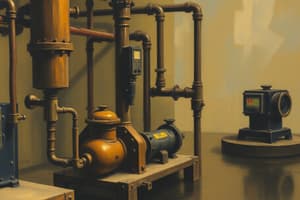Podcast
Questions and Answers
What is one of the applications of compressed air in the automotive industry?
What is one of the applications of compressed air in the automotive industry?
- Drying vehicles after washing (correct)
- Irrigating fields
- Charging electric vehicles
- Cooking food in cars
How do healthcare facilities utilize compressed air?
How do healthcare facilities utilize compressed air?
- In medical devices like nebulizers and anesthesia machines (correct)
- To operate theme park rides for patient entertainment
- To power cooking equipment in hospital cafeterias
- To grow medicinal plants in hospital gardens
In agriculture, how is compressed air technology used to enhance efficiency?
In agriculture, how is compressed air technology used to enhance efficiency?
- To develop new hybrid plant species
- For refining oil from agricultural products
- To control the weather conditions for crops
- To atomize fertilizer and herbicide solutions for precise application (correct)
What role does compressed air play in waste treatment plants?
What role does compressed air play in waste treatment plants?
How do food processing plants utilize compressed air?
How do food processing plants utilize compressed air?
What is the function of pneumatic transport systems like vacuum conveyors?
What is the function of pneumatic transport systems like vacuum conveyors?
What advantage does compressed air offer in manufacturing processes?
What advantage does compressed air offer in manufacturing processes?
Why are air-powered tools like nail guns and jackhammers favored on construction sites over electric counterparts?
Why are air-powered tools like nail guns and jackhammers favored on construction sites over electric counterparts?
What is a key advantage of using compressed air in mining operations?
What is a key advantage of using compressed air in mining operations?
In what industry are compressed air systems often utilized to replace hydraulic systems?
In what industry are compressed air systems often utilized to replace hydraulic systems?
What is a common application of compressed air in construction?
What is a common application of compressed air in construction?
How does compressed air contribute to increased portability in various industries?
How does compressed air contribute to increased portability in various industries?
Study Notes
Compressed Air Applications
Compressed air is widely used across various industries due to its versatility and effectiveness in powering tools and machinery. It can replace hydraulic systems in many cases, offering advantages such as lower capital costs, reduced maintenance requirements, improved safety, and increased portability. Here are some key applications of compressed air:
Manufacturing
In manufacturing processes, compressed air is commonly utilized for cleaning purposes. It can effectively remove dust, dirt, and other contaminants from surfaces without leaving behind any residue. Additionally, it's often used for automating processes, such as pneumatic cylinders and actuators.
Construction
Construction sites rely extensively on compressed air for powering handheld tools like nail guns, sandblasters, jackhammers, and breakers. These tools enable workers to perform tasks more efficiently and with less physical effort. Compared to electric counterparts, these air-powered tools have several advantages, including being less expensive, easier to maintain, and safer to operate since they don't require electrical cords.
Mining
Mining operations also benefit significantly from compressed air technology. In underground mines, compressed air is used to power drills, conveyors, and other heavy equipment. By replacing hydraulic systems with pneumatic ones, mining companies can save money on maintenance, reduce downtime, and improve overall safety conditions.
Automotive Industry
The automotive industry uses compressed air for numerous purposes. For instance, during the assembly process, compressed air is employed to clean, position parts, and seal joints in vehicles. Moreover, some car wash facilities utilize compressed air for their operation, providing a quick and efficient method of washing cars.
Healthcare Facilities
Healthcare facilities often use compressed air in medical devices, such as nebulizers for administering medication or oxygen tanks, anesthesia machines, or ventilators.
Waste Treatment Plants
Compressed air plays a crucial role in wastewater treatment plants through the application of aerobic treatment processes that help eliminate organic matter from wastewater. This process is essential for maintaining water quality standards and ensuring proper waste disposal.
Agriculture
Agricultural practices have adopted compressed air technology to enhance efficiency and productivity. Sprayers, for example, use compressed air to atomize fertilizer and herbicide solutions, allowing them to reach target areas more precisely while minimizing waste.
Food Processing
Food processing plants use compressed air for a variety of applications, including cleaning and sanitizing equipment, cooling processes, and pneumatically operated machinery. This technology helps maintain high standards of hygiene and efficiency in the production of food products.
Pneumatic Transport
Pneumatic transport systems, such as vacuum conveyors and pneumatic tubes, utilize compressed air to convey materials and products from one location to another. These systems offer advantages like low maintenance, energy efficiency, and ease of installation.
Energy Storage
Compressed air energy storage (CAES) systems store energy in compressed air and release it on demand, providing an alternative to batteries in energy storage applications.
In conclusion, compressed air is a versatile energy source with numerous applications across various industries. Its ability to replace hydraulic systems, combined with its portability, safety, and maintenance advantages, make it an invaluable tool in many modern processes.
Studying That Suits You
Use AI to generate personalized quizzes and flashcards to suit your learning preferences.
Description
Explore the diverse applications of compressed air across industries, from manufacturing and construction to mining, automotive, healthcare, agriculture, and more. Learn about the advantages of using compressed air in different fields and its role in enhancing efficiency, productivity, and safety.




